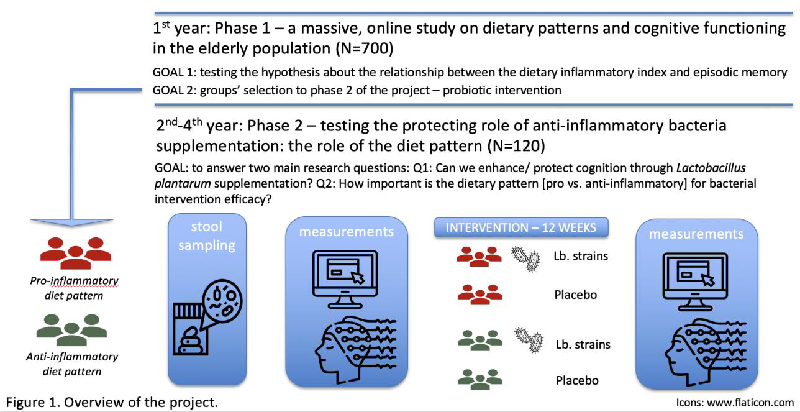We assume that some dietary patterns (e.g. so called Western Diet, where one consumes a lot of sugar and fat in a form of fast foods) cause neuroinflammation, especially visible in a part of the brain responsible for memory. We propose that a dietary intervention with an anti-inflammatory probiotic bacterium (Lactobacillus plantarum O20) will be able to mitigate this negative impact of proinflammatory diet. It is especially important to explore new ways of preserving cognition as our societies have to cope with growing numbers of elderly and obese members.
We want to check if supplementation with anti-inflammatory probiotics can modify the negative impact of the pro-inflammatory diet pattern, on cognition. We will investigate this relationship on two levels: behavioral with two known paradigms measuring long term (so called episodic) memory and short term memory. We will also study landmark psychophysiological correlates of this processes.
We plan to conduct a two-phase study on a large sample of adults, age 55 and up. In the second phase we want to include people over 60 years of age. We want to investigate whether supplementation with anti-inflammatory probiotics can modify the negative impact of the pro-inflammatory diet pattern on cognition. We will investigate this relationship on two levels: behavioral, with two known paradigms measuring long term (the so-called episodic) memory, and short term memory. We will also study landmark psychophysiological correlates of this processes, by measuring electrical activity of the brain using an electroencephalogram (EEG).
The study will include the following phases:
- An online study gathering data on dietary habits and assessing selected cognitive functions
- Experimental research investigating correlations between gut microbiota and the functioning of the brain and memory
During the first questionnaire phase, participants will provide information on the frequency of eating various foods, the quality of sleep, level of stress and tiredness, and mood, and will be asked to complete a cognitive task allowing us to assess functioning of their memory. Next, we will select two groups from the pool of the first phase participants – those with healthy and unhealthy dietary patterns.
During the second phase, some participants will take a special probiotic, while others will take a placebo, for 12 weeks. Before and after the second phase, we will measure participants’ cognitive functions and related psychophysiological indicators, using EEG. Before the probiotic intervention we will also test participants’ stool samples to establish a base line of their gut microbiome.

The gut-brain interactions are still scientific terra incognita. We already know that they are extremely important for the course of many mental processes, but little is known about cognitive functions in this context. Our project aims to add a tiny brick to this much-needed knowledge. At the same time, assuming success, our results have a chance to be translated into specific applications.

Brzezicka, Aneta
Principal Investigator
Role in the Faculty
{"funkcja-na-wydziale0":{"Funkcja":"Coordinator of the Cognitive Neuroscience Specialization, Vice-Chair of the Research Ethics Committee","\u0141\u0105cznik":"at the","Nazwa w mianowniku":"Faculty of Psychology in Warsaw"}}
Role in the Department
{"funkcja-w-katedrze0":{"Funkcja":"","\u0141\u0105cznik":"","Nazwa w mianowniku":"Department of Biological Psychology"}}
Role in the Institute
{"funkcja-w-instytucie0":{"Funkcja":"","\u0141\u0105cznik":"","Nazwa w mianowniku":"Institute of Psychology"}}
Role in the Research Center
{"funkcja-w-centrum0":{"Funkcja":"Head","\u0141\u0105cznik":"of the","Nazwa w mianowniku":"Neurocognitive Research Center (NCRC)"}}
Specialization
neuroscientist and cognitive psychologist
First and last name
Aneta Brzezicka
Academic degree or title
Ph.D. / Associate Professor
Email
This email address is being protected from spambots. You need JavaScript enabled to view it.
Position
profesor uczelni
Ph.D. / Associate Professor Aneta Brzezickaneuroscientist and cognitive psychologist
Application of results
We have previously shown (Bramorska et al., 2021) that the frequency of consuming different types of foods (healthy versus unhealthy dietary patterns) may constitute a protective or worsening factor in the age-related cognitive decline. In the study proposed here we want to further investigate the relationship between different food consumption (with a special emphasis of diet’s pro- or anti-inflammatory potential) and cognitive functioning in older age. Additionally, we want to verify the possibility of counteracting the negative impact of unhealthy (pro-inflammatory) diet patterns by supplementing our participants with a specially selected strain of bacterium with an anti-inflammatory potential.
Reserch team